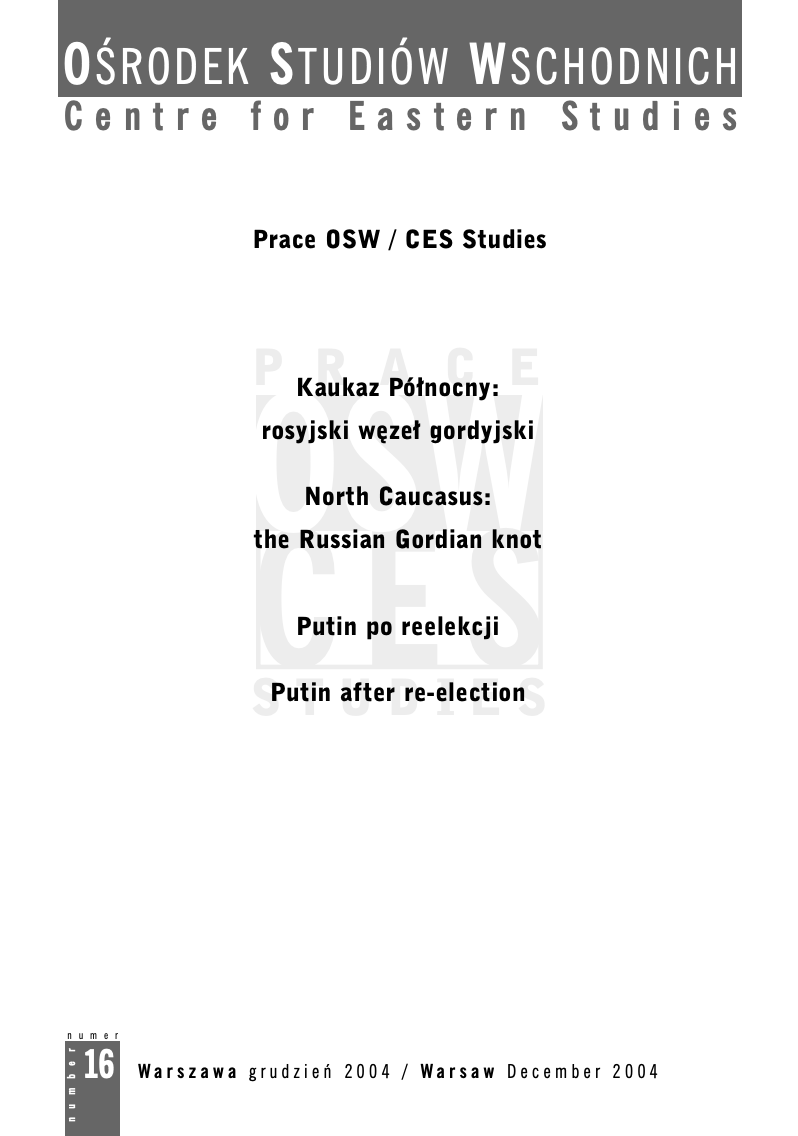Putin after re-election. The Kremlin's policy in Vladimir Putin's second term
Putin after re-election. The Kremlin's policy in Vladimir Putin's second term
Author(s): Jadwiga Rogoża
Subject(s): Politics / Political Sciences, Politics
ISSN: 1642-4484
Published by: OSW Ośrodek Studiów Wschodnich im. Marka Karpia
Keywords: Putin; Russia
Summary/Abstract: 1. Vladimir Putin's first term as President was a period of submitting political, regional and economic lobbies to the Kremlin. The actions Putin has taken since being re-elected are aimed at consolidating the Kremlin's control over the political, economic and social spheres. Further liquidation of political and informational pluralism, an increase of the ruling group's control over state and private property, and an intensification of state propaganda aimed at generating social support for the Kremlin's initiatives have all proceeded apace. These processes reinforce authoritarian tendencies and strengthen the emerging monocentric political system, with the President's strong domination over political, economic and social life. // 2. Since Putin's re-election no return to wide-ranging economic reforms can be observed; previously, the reformist impetus of the President's team had been checked halfway though his first term of office, with a view to the approaching parliamentary and presidential elections). Thus, the concentration of power in the President's hands (which had been repeatedly named as a sine qua non for the implementation of unpopular reforms) has not brought about any continuation of economic reforms. The authorities have limited themselves to selected actions in the social sphere and have made no attempts to reform the area of the natural resource monopolies. Nor have they guaranteed to put into practice the pro-market acts which had been passed during Putin's first term of office. Instead, one may observe the consumption of the fruits of the boom in the raw material markets, and the demonstration of Russia's remarkable economic indicators (which in fact mostly derive from high oil prices). Meanwhile, unfavourable conditions for long-term economic development in Russia are growing: the archaic structure of the economy is being strengthened (the overwhelming dominance of big businesses over small- and medium-sized enterprises in GDP production); the raw-material profile of the Russian economy is being reinforced (at the cost of services and technologies), the Kremlin's political control and "manual steering" of the economy is growing, and corruption (the which is a serious problem for the effective functioning of the Russian economy) has not been reduced. // 3. The elections and the beginning of Vladimir Putin's second term of office were a period which saw an increase in the Kremlin's control over both state and private property. This was done by strengthening the position of big state companies (especially in the raw materials sector), by increasing the amount of state regulation over the strategic sectors of the economy, and by tightening control of private companies. At the same time, the right to private property is being violated by the ruling elite. Under the pretext of collecting delinquent tax demands, the authorities are attempting to take over the assets of Russia's biggest private company, the oil concern Yukos. Such actions have already lead to an increased flight of capital from Russia, and to a general deterioration of the country's image as a stable, predictable economic partner which encourages foreign investments. // 4. In the last few months Russian political life has witnessed a visible intensification of Kremlin propaganda, based on the ideology of security. The authorities are trying to create an image of Russia as a country besieged by the hostile outside world (especially the West), and undermined from within by a democratic "fifth column". The Russian authorities, using the media, are requiring a unification of forces in the battle against terrorism. In practice, this means a strengthening of the President's powers at the cost of other centres of public life, as well as an intensification of xenophobia and distrust towards all forms of dissidence and dissent. Moreover, the Kremlin is trying to involve the Russian Orthodox Church in the struggle for people's minds. The authorities have appealed to Orthodox hierarchs for "active participation in fighting terrorism by boosting society's morale". // 5. Since the very beginning of Vladimir Putin's rule, we have witnessed a visible expansion in the appointment of security service representatives (the so-called "chekists"), as well as their increasing influence on politics, the economy and social issues. This tendency has been maintained since Putin's re-election. At the moment, the "chekists" have influence not only on state government issues, but also have increasing access to financial resources. At the present stage of Putin's rule, a wider process can be noted of appointing Putin's close colleagues from the security services to key posts in state-controlled companies. Also, the "chekists" activity keeps growing in the sphere of ideology.
Series: OSW Studies
- Page Count: 79
- Publication Year: 2004
- Language: English
- eBook-PDF

